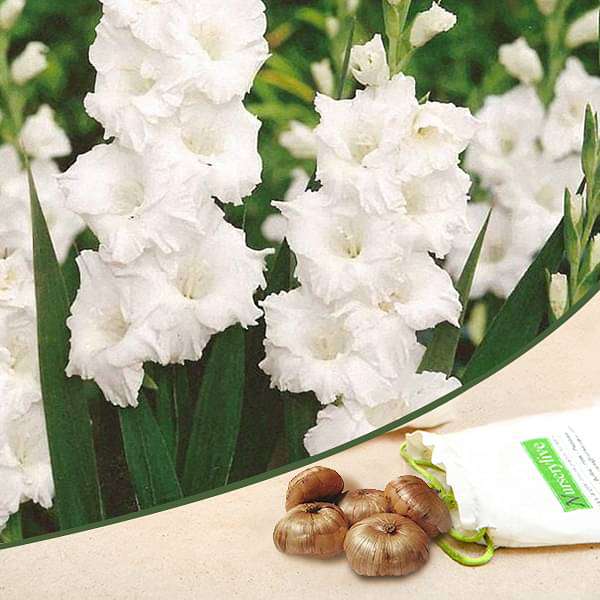Plantparadise
Gladiolus (White) - Bulbs (set of 5)
Gladiolus (White) - Bulbs (set of 5)
Regular price
Rs. 249.00
Regular price
Rs. 599.00
Sale price
Rs. 249.00
Unit price
per
Couldn't load pickup availability
(MRP
Gladiolus are available with flowers in a huge range of colors, including apricot, blue, burgundy, pink, gold, red, orange, and white, as well as multicolored varieties. It is sometimes called the sword lily. A great cutting flower, gladioli look beautiful in midsummer bouquets. Height ranges from 2 to 5 feet.
Their stems are generally unbranched, producing 1 to 9 narrow, sword-shaped, longitudinal grooved leaves. The flower spikes are large and one-sided. They are united at their base into a tube-shaped structure.| Common Name | Sword lily |
| Height | Up to 5 feet |
| Flower Colour | White |
| Bloom Time | Summer |
| Difficulty Level | Easy to grow |
Planting procedure
- Planting time is October for plains and March-April for hills.
- Dig a hole about 5 cm deep to sow the bulb.
- Set the bulb in the hole, pointy end up, then cover with soil and press firmly
- Space bulbs 6 to 8 inches apart
- Following are the suggested compositions for bulb plantation: Garden soil + Compost + Perlite + Sand (2:2:1:1) or, Soil + Cocopeat + vermicompost (1:1:1)
Gladiolus care
- Gladiolas bulbs submerge in the water until they do not germinate well
- After germinated bulb is planted in the potting mix
- Keep the plant where the maximum sunlight is available
- Watering should be done early in the morning if the soil is dry
- Water a plant when the soil feels dry to touch
- Water thoroughly in the summer and reduce watering for the winter & rainy season
- Try to water the plants in the morning around 8-10am
- You should remove dead, infected or damaged plant parts and throw in the garbage collector
- You should fertilize a plant at planting time and growing season
- Mulch the potting mix with organic material
| Sunlight | Full to partial sunlight |
| Watering | Moderately |
| Soil | Sandy loam soil |
| Temperature | 20 to 30 degrees C |
| Fertilizer | Apply any organic fertilizer. |
Gladiolus special feature
Attractive flower
Gladiolus uses
- This flowering bulbous plant is used as the ornamental purpose.
Materials
Materials
Shipping & Returns
Shipping & Returns
Dimensions
Dimensions
Care Instructions
Care Instructions


